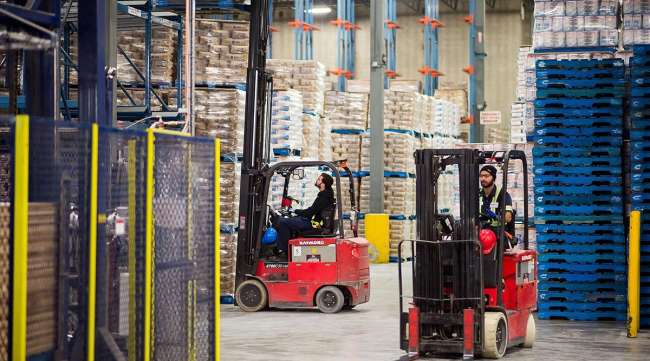Bloomberg News
Canada May Run Out of Warehouse Space This Year

[Stay on top of transportation news: Get TTNews in your inbox.]
Canada is in danger of running out of warehouse space by the end of the year, thanks to the boom in e-commerce sparked by the pandemic.
While a near-record 26.1 million square feet of logistics real estate is under construction, much of it is already leased, according to a report released April 6 by commercial-property brokerage CBRE Ltd. And with vacancy rates for existing warehouses at historic lows, it soon may become nearly impossible for businesses to find places to store their goods.
“There’s a significant amount of industrial space that’s needed just to keep up with the change in behavior toward e-commerce,” said Kyle Hanna, executive vice president of CBRE’s industrial and logistics business. “By the later part of this year, we won’t have space for anyone to go into.”
Canada lagged behind other developed countries in e-commerce adoption heading into the pandemic, but more recently, online sales have grown faster than in other Western nations, according to researchers at JPMorgan Chase & Co. The share of shoppers who made at least 40% of their purchases online more than doubled by April 2020 from the rate before the pandemic, the bank said in a report.
With the country now battling a renewed surge of COVID-19 cases and restrictions, the conditions that have made e-commerce a central part of Canadians’ routines seem likely to persist for at least a little longer.
The trend has prompted businesses to snap up industrial real estate at a record clip. About 10.4 million square feet of warehouse space was leased across Canada in the first three months of this year, the CBRE report shows. Vacancy rates in the largest cities — Toronto, Vancouver and Montreal — tightened to the lowest levels in all of North America, the brokerage said.
With new development coming online too slowly to fill the gap in those cities, landlords may have to consider converting retail and office buildings left largely unused during the pandemic into logistics hubs, according to Hanna.
In one such deal, Amazon Canada Fulfillment Services spent C$40 million ($32 million) last month to buy 40 acres in the Toronto suburb of Pickering that had been home to a local flea market, according to records from data provider Altus Group.
“Industrial tenants and developers are having to get creative to free up some space,” Hanna said. This is “a very lean year, making it tough for tenants.”
Want more news? Listen to today's daily briefing below or go here for more info:




